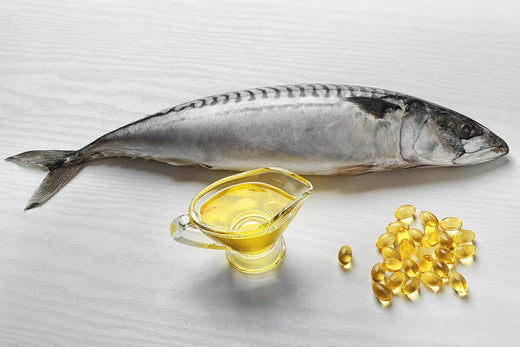Fatty acids are the foundations of dietary fats, helping form the building blocks of many cells and systems in our bodies. There are three abundant and beneficial types of fatty acids. These are omega-3, omega-6, and omega-9. Each of these fatty acid groups provides its own nutritional value, and they all play important roles in your health.
Some of these fats are essential, while others are non-essential but still beneficial. Either way, you should strive to obtain a balanced intake of all three types for their potential health benefits.
What Are Omega-3 Fatty Acids?
Omega-3 fatty acids are polyunsaturated fats, which means that chemically, they are made up of many double bonds. Your body cannot produce omega-3 on its own, so you must obtain these fats through your diet. Because the only way to get them is through food, they are considered “essential fats.”
Omega-3 fatty acids can have several different types of chemical makeup, but ultimately, there are three main types of omega-3 fatty acids. These are:
- Eicosapentaenoic acid (EPA)
- Docosahexaenoic acid (DHA)
- Alpha-linolenic acid (ALA), which is a short-chain fatty acid precursor
Each of the three types of omega-3s has its own benefits, but your body must receive an adequate amount of each, either through dietary choices or supplementation. ALA omega-3s can be converted into EPA in the body and then into DHA, but this conversion only happens in small amounts, making it essential to get EPA and DHA directly.
What Are the Main Sources of Omega-3?

The three different types of omega-3 fats are found separately in various foods. ALA is the most abundant omega-3 in the Western diet, while DHA and EPA can be found paired together in many kinds of seafood.
Some of the most significant sources of omega-3 are:
- Salmon
- Mackerel
- Anchovies
- Sardines
- Tuna
Fatty fish sources are abundant in both EPA and DHA omega-3s and are the main source of both types, giving the two acids the nickname marine omega-3s. All other sources of omega-3s, specifically plant-based sources, contain only ALA omega-3s. The only plant-based source of EPA and DHA omega-3 is algae.
What Are the Benefits of Omega-3?
Each type of omega-3 potentially offers its own specific benefits. In general, omega-3s can help support the body’s system in several significant ways. For example, omega-3s are well-known for supporting cardiovascular health and function. Some people believe these fats help play a role in maintaining healthy blood pressure and cholesterol levels already within the healthy range. They are also known for supporting eye health.
DHA can be a great addition to your diet if you’re pregnant. More specifically, DHA can support healthy brain development and maintain nervous system function in a child. Even in adulthood, DHA omega-3s can support brain health by helping maintain normal cognitive function, including memory and motor skills.
EPA may help support overall emotional wellness. During pregnancy, EPA also plays an important role by helping to support the healthy development of the fetus and can support feelings of mental wellness in the mother.
What Are Omega-6 Fatty Acids?
Omega-6, much like their omega-3 counterparts, are polyunsaturated fatty acids, indicating their chemical structure includes more than one double bond. However, they do differ slightly in their chemical composition. As a result, omega-6 fats can be metabolized into longer-chain fats such as arachidonic acid (ARA).
These fatty acids are also considered essential, meaning the body cannot produce them independently; they must be obtained through the diet. Omega-6 fatty acids are more abundant in a standard Western diet compared to omega-3s due to the prevalence of certain food sources in typical dietary patterns.
What Are Sources of Omega-6?

In the average American diet, the intake of omega-6 fatty acids typically surpasses that of omega-3s. While it’s often recommended to balance your servings of omega-6 with omega-3 to support optimal health, there’s no established concern with consuming high amounts of omega-6 fatty acids, provided they are part of a balanced and varied diet.
Omega-6 fatty acids are especially prevalent in several types of refined vegetable oils, which, despite their high omega-6 content, aren’t always considered the most nutritious sources due to their processing methods. However, there are numerous other sources of omega-6, many of which are plant-based, making them suitable for various dietary preferences. Some of these sources include:
- Soybean oil
- Safflower oil
- Sunflower oil
- Borage oil
- Evening primrose oil
- Flaxseed oil
- Canola oil
- Almonds
- Sunflower seeds
- Cashews
- Chia seeds
What Are the Benefits of Omega-6?
Just like omega-3s, omega-6s serve several important functions within the body. One of their primary benefits is their ability to support energy production, contributing to overall vitality and well-being. Additionally, when combined with a sufficient intake of omega-3s, omega-6 fats can help the body properly manage its inflammatory response, a crucial aspect of many physiological processes and the body's ability to heal.
While there is some debate over the potential health implications of consuming high amounts of omega-6 fatty acids, most research suggests that when consumed as part of a balanced diet, particularly one that also includes an ample supply of omega-3s, they offer numerous health benefits. Therefore, while it's worthwhile to be mindful of your omega-6 intake, these essential fatty acids remain a valuable part of a comprehensive nutritional approach.
What Are Omega-9 Fatty Acids?
Unlike omega-3 and omega-6, omega-9s are monounsaturated fats. This type of fat is chemically characterized by the presence of a single double bond.
Another key difference that separates omega-9 is that it’s not considered an “essential” nutrient because the human body can naturally produce it. Despite this ability, they still remain an important nutrient to include in your diet due to their numerous health benefits.
There are several types of omega-9 fatty acids, including hypogeic acid, elaidic acid, erucic acid, gondoic acid, and nervonic acid. However, the most prevalent form of omega-9 is oleic acid. This fatty acid is abundant in cell membranes and plasma throughout the body and is the primary form of omega-9 found in a standard diet.
What Are the Benefits of Omega-9?
Omega-9 fatty acids, much like their omega-3 and omega-6 counterparts, offer a host of health benefits. Foods that are rich in oleic acid and other omega-9 fatty acids are known to support several key physiological functions.
For starters, they can contribute to a healthy immune system, aiding in the body's defense against illness and infection. Additionally, omega-9 fatty acids play a role in maintaining healthy eye function, supporting visual health and potentially offering protective benefits.
Furthermore, omega-9 fatty acids are beneficial for heart health. They can help maintain healthy cholesterol levels, support cardiovascular function, and contribute to overall heart health.
What Are Sources of Omega-9?

Omega-9 fats are widely found in a variety of foods, especially in vegetables, seeds, and nuts. More specifically, they are abundant in the following sources:
- Olive oil
- Peanut oil
- Avocado oil
- Sesame oil
- Almonds
- Cashews
- Walnuts
- Pistachios
- Macadamia nuts
t's also worth noting that many commonly consumed foods, such as chicken, eggs, and certain types of fish, also contain smaller amounts of omega-9 fatty acids.
As omega-9s are considered non-essential, there isn't a specific recommended daily intake. However, incorporating a variety of the above-mentioned foods into your diet can help ensure you benefit from the positive health effects of these monounsaturated fatty acids.
Should I Take an Omega-3, Omega-6, or Omega-9 Supplement?
Whenever possible, you should try to receive a significant amount of all three fatty acids from healthy sources in your diet. If you feel you are not getting enough omega-3-6-9 fatty acids from your diet, you could consider taking a supplement. Because there are so many potential benefits associated with each of the three fatty acids, the most important question is what type of supplement you need.

This is such a thing as an omega 3-6-9 supplement that can balance all three fatty acids, offering various ratios of the three nutrients. For example, they may include the ingredients omega-3:6:9 at a ratio of 2:1:1. Some supplements may have a higher ratio of omega-3 than the other two types.
Typically the amount of omega-3 is higher in any supplement because it is an essential fatty acid. Since omega-6s are very abundant in a Western diet and omega-9s can be produced by the body, the body typically has the largest need for omega-3s.
If you are on a plant-based diet, you may prioritize taking a supplement that is high in omega-3s since it is most abundant in fish and harder to obtain otherwise. Even plant-based supplements that prioritize omega-3 intake can contain a significant amount of the other two forms of fatty acids.
An iwi life omega-3 supplement also contains a balanced amount of omega-6 and omega-9 fatty acids, allowing you to potentially obtain a significant amount of omega-3 while still maintaining a healthy balance of the other two fatty acids. Even more impressive, this supplement is made from algae, which directly provides DHA and EPA omega-3s, requiring no conversions in the body.
How Does iwi life Farm Its Supplements?
Here at iwi life, we’re deeply committed to sustainability in all aspects of our operation, including the farming of our supplements. We firmly believe that maintaining the health of our planet is just as important as supporting the health of our customers. That's why we've adopted farming practices that are not only sustainable but also contribute positively to the environment.
One of the key components of our supplements is algae, a powerhouse of nutrition that forms the basis for our omega-3 supplements. Algae, being the original source of omega-3s within the food chain, provides us with a potent, vegan-friendly source of these essential fatty acids, including both DHA and EPA.
Our algae are grown on a land-based farm, which allows us to control the growing conditions precisely and ensures that our algae are free from ocean-borne contaminants. This form of farming requires significantly less water than traditional agriculture and eliminates the need for deforestation or overfishing, making it an incredibly sustainable choice.
Not only that, but our algae farms are carbon-negative. Algae naturally absorb carbon dioxide as they grow, helping to reduce greenhouse gas emissions. By choosing iwi life supplements, you're not only investing in your health but also supporting a company that prioritizes the health of our planet.
We are proud of our commitment to sustainable farming and continue to strive for practices that respect and protect our environment. When you choose iwi life, you're choosing a brand that values sustainability as much as it values your health and wellness.
Experience All the Benefits of Omega 3-6-9
Omega 3-6-9 nutrients are all beneficial, healthy fats that you should include in your diet whenever you can. At iwi life, we want to help you get all of the important nutrients you need from trusted, natural sources. When you choose an iwi life omega-3 softgel supplement, you can find peace of mind that you will receive a sufficient amount of each of the three important fatty acids (without the “fish burps” side effect or potential for rancidity of fish oil supplements).
Since our omega-3 supplement is made from the power plant that is algae, you can trust that you are receiving true DHA and EPA omega-3s directly, and your body does not need to do any conversions.
We make our products with your health and the planet in mind. To support your overall health and wellness, explore our whole assortment of plant-based supplements.
Sources:
Omega-3 Fatty Acids | National Institutes of Health
Effects of Omega-3 Fatty Acids on Mental Health: Summary | NCBI
Omega-6 fatty acids Information | Mount Sinai - New York.



















